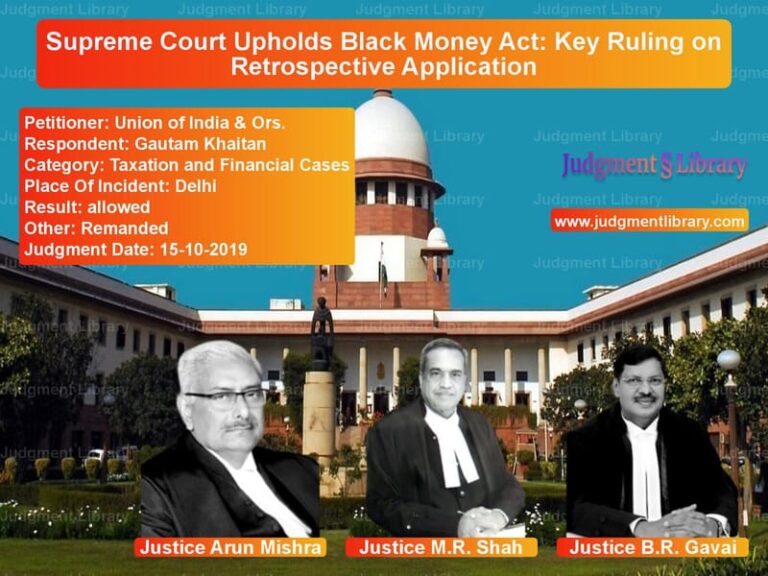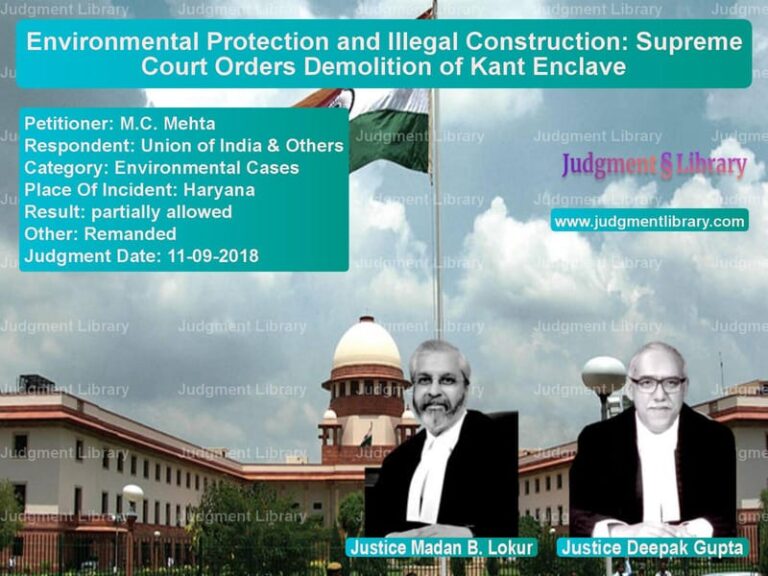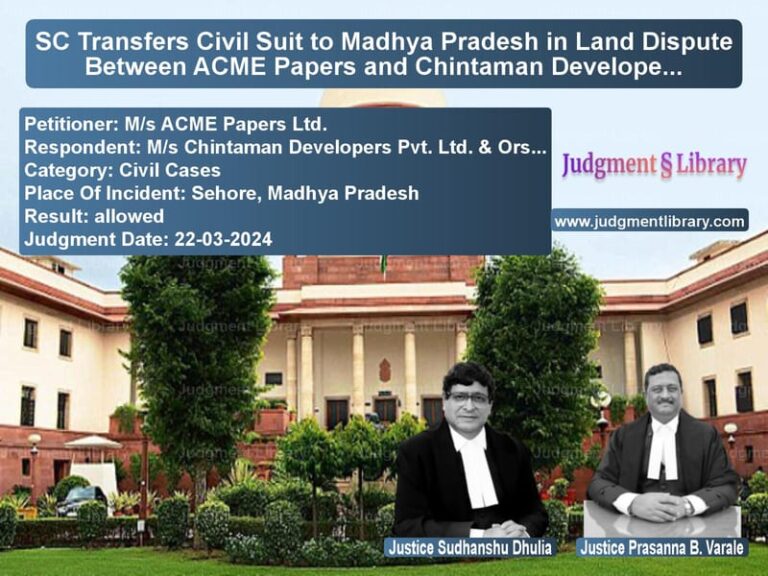Interest Rate Reduction in Arbitration Awards: Analysis of the Executive Engineer v. Gokul Chandra Kanungo Case
The present case revolves around the arbitration dispute between Executive Engineer (R and B) and others, and the legal representatives of Gokul Chandra Kanungo. This case primarily involves the issue of the award of interest on delayed payments in an arbitration proceeding and the competence of the arbitral tribunal to fix such interest rates. The case also explores the applicability of the Arbitration and Conciliation Act, 1996, particularly the discretion of the arbitrator to award interest and the grounds for reducing such interest rates. The Supreme Court has partly allowed the appeal, reducing the awarded interest rate from 18% to 9% per annum. This blog post provides a detailed analysis of the court’s reasoning, the arguments from both the petitioner and the respondent, and the final judgment passed by the Supreme Court.
Background of the Case
The case arose when Gokul Chandra Kanungo, the respondent, was awarded a contract for the construction of a missing link on National Highway 6 in 1971. The project, which had an original completion date of 15th December 1972, faced significant delays and was only completed in August 1977. Despite the delayed completion, the respondent had already been paid Rs.3,36,465 against the agreed contract sum of Rs.4,59,330. The respondent then issued a notice in 1989, claiming an additional amount of Rs.3,34,744, but no further action was taken until 1990 when the dispute was referred to arbitration.
Petitioner’s Arguments
The appellants, represented by the Executive Engineer and other officials, raised several points in their defense against the arbitration award:
- Delay in Raising the Claim: The petitioners argued that the respondent had delayed his claim for almost twelve years, from the completion of the work in 1977 to the notice in 1989. This delay, according to the petitioners, disqualified the respondent from claiming interest for that period.
- Failure to File the Agreement: The appellants highlighted that the respondent failed to file the original F-2 agreement, as directed by the trial court in 1990. The delay in filing the agreement, they argued, contributed to the delay in arbitration proceedings, thus reducing the legitimacy of the interest claim.
- Exorbitant Interest Rate: The petitioners contended that the interest rate of 18% per annum awarded by the arbitrator was excessive and unreasonable, especially considering the long delay in raising the claim and the general economic conditions.
- Legal Precedents: The petitioners relied on previous Supreme Court rulings, including those in Rajendra Construction Co. v. Maharashtra Housing & Area Development Authority and McDermott International Inc. v. Burn Standard Co. Ltd., which emphasized that interest rates in arbitration should be reasonable and in line with the prevailing legal standards.
Respondent’s Arguments
The respondent, represented by Gokul Chandra Kanungo’s legal heirs, presented counterarguments to defend the arbitration award:
- Reasonable Interest: The respondent argued that the interest rate awarded by the arbitrator was justified, given the long period during which the payments were delayed and the substantial outstanding dues. They contended that the arbitrator had exercised his discretion reasonably in awarding 18% interest.
- Legal Validity of Interest Award: The respondent pointed out that under Section 31(7)(a) of the Arbitration and Conciliation Act, 1996, the arbitrator had the discretion to award interest at a rate deemed reasonable. The respondent argued that the arbitrator’s decision was in accordance with the law and should not be interfered with.
- No Delay in Arbitration Filing: The respondent claimed that the delay in filing the original agreement and initiating arbitration proceedings was not unreasonable, as it was due to the procedural complexities and legal formalities at the time.
- Consistency with Legal Precedents: The respondent also referenced legal precedents that supported the arbitrator’s discretion in determining the interest rate, such as the cases of Hyder Consulting (UK) Ltd. and Rajendra Construction Co. The respondent argued that the court should uphold the arbitrator’s decision unless it was patently unjust.
The Court’s Reasoning
The Supreme Court, after considering the arguments presented by both parties, arrived at the following conclusions:
- Discretion of the Arbitrator: The Court acknowledged that under Section 31(7)(a) of the Arbitration and Conciliation Act, 1996, the arbitrator has the discretion to award interest at a rate deemed reasonable. However, the Court emphasized that this discretion should be exercised judiciously, taking into account the circumstances of the case, including the delay in raising the claim and the conduct of the parties involved.
- Delay in Raising the Claim: The Court found that the respondent’s delay in raising the claim for almost twelve years, from the completion of the work in 1977 to the notice in 1989, was significant. The Court noted that the respondent had ample opportunity to raise his claim earlier but chose not to, which impacted his entitlement to interest for that period.
- Interest for Delayed Period: The Court ruled that the respondent would not be entitled to interest for the period between 30th August 1977 and 25th July 1989, as well as for the period between 14th February 1990 and 4th February 2000, due to the respondent’s inaction during those periods. The Court held that a party cannot benefit from its own delay in pursuing legal claims.
- Reduction of Interest Rate: The Court, exercising its powers under Article 142 of the Constitution, decided to reduce the awarded interest rate. Taking into consideration the long lapse of time and the delay in pursuing the claim, the Court found that the interest rate of 18% per annum was excessive. The Court reduced the interest rate to 9% per annum, which was deemed to be fair and reasonable under the circumstances.
- Precedents on Interest Rates: The Court referred to previous judgments, including Rajendra Construction Co. v. Maharashtra Housing & Area Development Authority and McDermott International Inc. v. Burn Standard Co. Ltd., where the interest rate was adjusted to ensure that it was reasonable in light of the case’s facts. The Court also referenced the case of Krishna Bhagya Jala Nigam Ltd. v. G. Harischandra Reddy, where the interest rate was reduced due to the delay in raising the claim and the prevailing economic conditions.
The Court’s Decision
The Supreme Court partly allowed the appeal, making the following orders:
- No Interest for Delayed Period: The respondent would not be entitled to any interest for the period between 30th August 1977 and 25th July 1989, and for the period between 14th February 1990 and 4th February 2000.
- Interest Rate Reduced: For the remaining period, at all three stages (pre-reference, pendente lite, and post-award), the respondent would be entitled to interest at the reduced rate of 9% per annum.
- Execution of Payment: The Court directed the parties to submit their calculations before the executing court, which would quantify the amount due within one month. The executing court was to determine the amount in accordance with the Court’s directions, and the appellants were to make the payment within one month thereafter.
Conclusion
This case highlights the Court’s approach to arbitration awards and the discretion exercised by arbitral tribunals in awarding interest. While acknowledging the arbitrator’s discretion, the Court also emphasized the importance of fairness, especially when there are significant delays in raising claims. The Court’s decision to reduce the interest rate reflects its role in ensuring that arbitration awards are just and reasonable, taking into account both the legal rights of the parties and the practicalities of the case.
Petitioner Name: Executive Engineer (R and B) and Others.Respondent Name: Gokul Chandra Kanungo (Dead) Through His LRs.Judgment By: Justice B.R. Gavai, Justice B.V. Nagarathna.Place Of Incident: Orissa.Judgment Date: 30-09-2022.
Don’t miss out on the full details! Download the complete judgment in PDF format below and gain valuable insights instantly!
Download Judgment: executive-engineer-(-vs-gokul-chandra-kanung-supreme-court-of-india-judgment-dated-30-09-2022.pdf
Directly Download Judgment: Directly download this Judgment
See all petitions in Contract Disputes
See all petitions in Debt Recovery
See all petitions in Damages and Compensation
See all petitions in Arbitration Act
See all petitions in Bail and Anticipatory Bail
See all petitions in Judgment by B R Gavai
See all petitions in Judgment by B.V. Nagarathna
See all petitions in partially allowed
See all petitions in supreme court of India judgments September 2022
See all petitions in 2022 judgments
See all posts in Civil Cases Category
See all allowed petitions in Civil Cases Category
See all Dismissed petitions in Civil Cases Category
See all partially allowed petitions in Civil Cases Category







